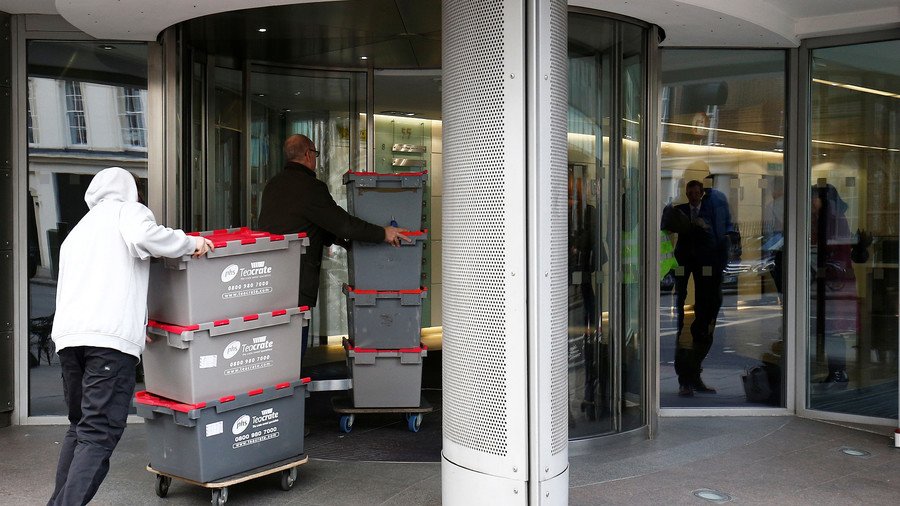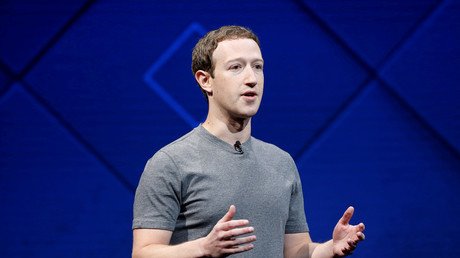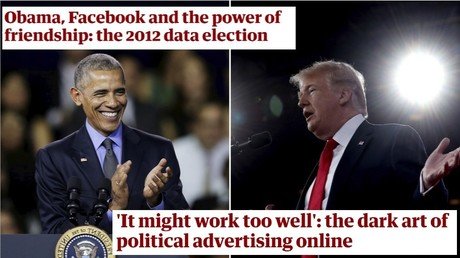Face it: Cambridge Analytica story proves Facebook doesn’t give a toss about privacy or democracy

Mainstream media have obsessed over Russia’s alleged use of Facebook to swing the 2016 US election. In reality, it was actually a shady British data-mining firm that was running pro-Trump Facebook propaganda campaigns.
Irony doesn’t feel like strong enough a word.
Which is worse? Russia allegedly buying a few hundred Facebook ads, with the goal of ‘sowing unrest’ in the United States, by exploiting already emotional and divisive issues like gun control and race relations, or Facebook allowing a dodgy British company to mine the data of millions of its users, without the users’ explicit knowledge or consent, and then using that data for political purposes?
If you need a recap: British firm Cambridge Analytica (CA), working with the Trump campaign, harvested private information from 50 million Facebook users without their knowledge — and then used that information in an attempt to influence the election in Trump’s favor. CA was reportedly paid $5 million by the Trump campaign for their efforts. Oh, and former Trump White House chief strategist Steve Bannon used to head the company.
So now we find out, after all the hand-wringing about how Russia elected Trump through its evil social media manipulations, that there were, in fact, other, perhaps far more influential, forces at play.
“We exploited Facebook to harvest millions of people’s profiles. And built models to exploit what we knew about them and target their inner demons. That was the basis the entire company was built on,” said CA whistleblower Christopher Wylie.
There are so many levels of irony to this story, it’s hard to know where to begin.
But let’s start with this: At the same time that Cambridge Analytica was mining Facebook data to help Trump, top executives at Facebook were actively working to help Trump opponent Hillary Clinton. Leaked emails between Facebook Chief Operating Officer Sheryl Sandberg and Clinton campaign chairman John Podesta revealed that Facebook provided research to Clinton in 2015. According to the emails, Sandberg “badly” wanted Clinton to win and she met privately with the candidate on multiple occasions.
Here’s where it gets really interesting, though. Cambridge Analytica doesn’t discriminate. After Trump’s election, the data firm’s parent company SCL Group won a contract from the US State Department to — wait for it — help combat propaganda on Facebook.
You know, it’s almost like Cambridge Analytica and Facebook each are companies primarily interested in money and which act with no moral qualms whatsoever. One can even imagine, if they try hard enough, that while Facebook executives personally seem to prefer Democrats, the company would help anyone, so long as a big fat check was involved.
Since the Cambridge Analytica scandal broke, thanks to Wylie, Facebook has tried to play the victim — and quite successfully, too, given that most of the focus has been on CA and its dirty tricks and not the fact that it is a giant data company like Facebook that allows it to happen in the first place.
Facebook claims that it was misled by CA and acted to suspend the firm from its platform. But Facebook is no victim. The social media giant still insists CA’s use of the data from 50 million of its users’ accounts was not a data breach because, somewhere within the tangle of Facebook’s intentionally complicated privacy settings, users had technically consented to having their data mined.
Don’t let Facebook’s faux outrage at CA’s behavior fool you. In the midst of all this drama, a former high-level staffer on Barack Obama’s 2012 presidential campaign has come out and admitted that Facebook allowed the Obama campaign to do much the same thing to help him, that Cambridge Analytica did to help Trump four years later.
Carol Davidsen wrote on Twitter that Facebook staff were very open and candid with the Obama campaign, writing that “they allowed us to do things they wouldn’t have allowed someone else to do because they were on our side”.
Those activities included “suck[ing] out the entire social graph” — in other words an individual user’s entire network of Facebook friends — in an effort to target more potential voters through friends lists.
“The privacy policies at that time on Facebook were – if they opted in, they could tell us who all their friends were. So, they told us who all their friends were. We were actually able to ingest the entire social network of the US that’s on Facebook, which is most people,” Davidsen wrote.
So who is really more to blame here? A company like Cambridge Analytica, that uses political bribes and honey traps to discredit people — or a social media giant that sells the personal data of its users to the highest bidder? Or... Russia?
I’m inclined to agree with NSA whistleblower Edward Snowden, who wrote on Twitter: “Facebook makes their money by exploiting and selling intimate details about the private lives of millions, far beyond the scant details you voluntarily post. They are not victims. They are accomplices.”
Speaking of whistleblowers, it’s been interesting to see how the media has treated the Cambridge Analytica whistleblower vs. how they treat whistleblowers like Julian Assange, Chelsea Manning — and Snowden himself. When the whistleblower reveals information that suits the prevailing narrative, they are lauded as brave heroes and truth seekers. When they reveal something that doesn’t quite fit the story they are promoting, whistleblowers suddenly become abominable traitors deserving of no mercy.
Now comes the question of what should be done about all this sneaky business on Facebook. Luckily, I have a couple of suggestions.
First and foremost, Washington should immediately sanction the UK over the now-blatant attempts of a British company to meddle in and influence the American presidential election. I mean, it only seems fair. All sorts of accusations should be immediately levelled at the British government. Most importantly, absolutely no effort should be made to separate Cambridge Analytica from either Downing Street or the British public in general.
Second, the media should spend weeks, if not months, analyzing the motives of dodgy British political operatives and their efforts to secure a Trump victory. Journalists should get to work whipping up massive anti-British fervor and use any opportunity they can to get “the British” into their headlines about evil online influence campaigns.
In all honesty, there really is not much difference between Cambridge Analytica and Facebook. They both use our data for political and financial purposes — Facebook just seems to do it all on a far wider and more consistent basis.
It was only in January that Facebook admitted in a series of official blog posts, that it had a “moral duty” to understand how its technology was being used and to figure out “what can be done to make communities like Facebook as representative, civil and trustworthy as possible.” In response to allegations of Russian meddling and ‘fake news’ on the platform, Facebook said it was taking “steps in partnership with third-party fact checkers to rank these stories lower”.
That’s right: Employing unidentified “fact checkers” was supposed to help solve the fake news problem, while companies like Cambridge Analytica were out there hoovering up data from millions of users without their knowledge and using it for political propaganda purposes. But Facebook, we’re supposed to believe, knew nothing about that.
Facebook doesn’t really care a toss about your privacy or your democracy — and if this Cambridge Analytica scandal doesn’t make that clear, nothing will.
Think your friends would be interested? Share this story!
The statements, views and opinions expressed in this column are solely those of the author and do not necessarily represent those of RT.


















